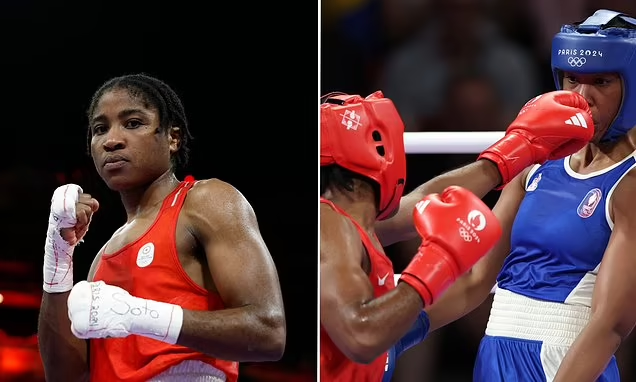Cindy Ngamba, a 25-year-old boxer born in Cameroon and residing in Britain as a refugee, has written a new chapter in Olympic history by securing the first-ever medal for the Refugee Olympic Team. Ngamba’s triumphant journey reached its zenith on Sunday when she defeated sixth-seeded Frenchwoman Davina Michel by unanimous decision, advancing to the women’s 75kg semi-finals at the Paris 2024 Olympics.

With both losing semi-finalists guaranteed bronze medals, Ngamba’s victory ensures she will stand on the Olympic podium, marking a watershed moment for refugee athletes worldwide. Following her historic win, Ngamba expressed her emotions, stating, “It means the world to me to be the first ever refugee to win a medal. I’m just a human, just like any other refugee and athlete all around the world.”
Ngamba’s path to this moment has been fraught with challenges. Having moved to the UK at the age of 10, she finds herself in a unique position where she cannot compete for Team GB due to her lack of a British passport. Her situation highlights the complex realities faced by many refugee athletes, straddling multiple identities and navigating complex immigration systems.
The boxer’s achievement is particularly significant for the Refugee Olympic Team, which first competed at Rio in 2016. Prior to Paris 2024, the team’s best results were two fifth-placed finishes in Tokyo. Ngamba, who served as the team’s flagbearer at the opening ceremony in Paris, now looks forward to her semi-final bout against Atheyna Bylon of Panama on Thursday, approaching it with determination and confidence.

Ngamba’s personal story adds depth to her athletic achievements. Unable to return to Cameroon due to her sexuality, with homosexuality punishable by up to five years in prison in her home country, she has spent 15 years in England. However, her fight extends beyond the boxing ring as she continues to struggle for a visa and UK citizenship. Five years ago, she narrowly avoided deportation after being arrested during what she thought was a routine check-in with authorities.
Despite these challenges, Ngamba’s talent has been recognized. GB Boxing made unsuccessful attempts to add her to their ranks for the Olympic programme, even appealing to the Home Office to grant her citizenship. Undeterred, Ngamba won a scholarship with the IOC refugee team, becoming the first female boxer to represent the team at an Olympic Games.
As Ngamba prepares for her semi-final match, her story serves as a powerful reminder of the resilience and determination of refugee athletes. Her success not only breaks new ground for the Refugee Olympic Team but also highlights the ongoing challenges faced by displaced individuals in their quest for belonging and recognition on the world stage. Ngamba’s historic medal stands as a testament to the power of sport to transcend borders and provide opportunities for those seeking a place to call home.
bbc.com



